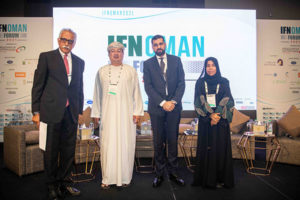
- IFN Oman Forum 2021
-
 AMJ partnered the Islamic Finance News in staging a successful 6th IFN Oman Forum at the Grand Millennium, Muscat on 26th October 2021. The day-long annual event attracted a record number of industry players, regulators and legal experts gathered to deliberate the future of Islamic retail banking, capital markets and takaful in Oman. The forum was attended by delegates physically as well as virtually.
AMJ partnered the Islamic Finance News in staging a successful 6th IFN Oman Forum at the Grand Millennium, Muscat on 26th October 2021. The day-long annual event attracted a record number of industry players, regulators and legal experts gathered to deliberate the future of Islamic retail banking, capital markets and takaful in Oman. The forum was attended by delegates physically as well as virtually.The forum opened with a key note address to an audience of bankers, issuers and other key stakeholders from across the Middle East, Europe and Asia from H.E. Tahir Salim Al Amri, the Executive President of the Central Bank of Oman who welcomed the speakers covering topics of transition and sustainability, sukuk and investment funds, linked finance, Islamic fintech and crowdfunding platforms and issues facing Islamic banks and Islamic financing in Oman. He noted that “outlining the strategic direction of the Islamic banking industry will promote the healthy and balanced growth of the sector, attract foreign investors, and ease the path for collaboration between international and regional partners, Islamic finance standard setters and multilateral organisations for training, awareness building and transfer of knowledge. Despite unprecedented macroeconomic developments and Covid-induced challenges, Oman’s Islamic banking sector demonstrated a robust and consistent performance”. During 2021, Islamic banking in Oman accounted for OMR 5.7 billion (15.13 per cent) of total banking assets as of June 30 2021, the impressive growth had led the Sultanate to become the 15th largest Islamic banking market at the international level.
During the course of the day, a high-level line-up of speakers participated in a series of panel discussions. Mr Mansoor J Malik participated as a moderator in a panel session, discussing a range of varied topics: including how incentives under Oman Vision 2040 could provide a stimulus for the real economy by supporting funding for SMEs and corporates, how the sector could support the shift away from hydrocarbons toward a more diversified economy, and how Islamic banks could work toward developing more social impact products and strategies to promote entrepreneurship and financial inclusion in the country.



